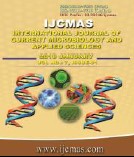


 National Academy of Agricultural Sciences (NAAS)
National Academy of Agricultural Sciences (NAAS)

|
PRINT ISSN : 2319-7692
Online ISSN : 2319-7706 Issues : 12 per year Publisher : Excellent Publishers Email : editorijcmas@gmail.com / submit@ijcmas.com Editor-in-chief: Dr.M.Prakash Index Copernicus ICV 2018: 95.39 NAAS RATING 2020: 5.38 |
Genetic diversity was performed among F2 plants of the cross RH 30×CS 52 in Indian mustard (Brassica juncea) (CS 52 is salinity tolerant and RH 30 is salinity susceptible) using SSR markers. Out of 358 SSR markers, 42 were found polymorphic and 154 were monomorphic. A total of 225 alleles, ranging from 2 to 4 were amplified. The PIC (Polymorphic Information Content) value ranged from 0.427-0.730 of Jaccard’s similarity coefficients was generated between these F2 populations. F2 population was grouped in 2 major clusters and 37 sub-clusters at a similarity coefficient of 0.58. The allelic information indicated that the genotypes used in the present study have distinct genetic patterns. It was concluded that SSR markers are more reliable and will be helpful in selecting diverse genotypes which can be used to identify QTL related to salinity.
 |
 |
 |
 |
 |